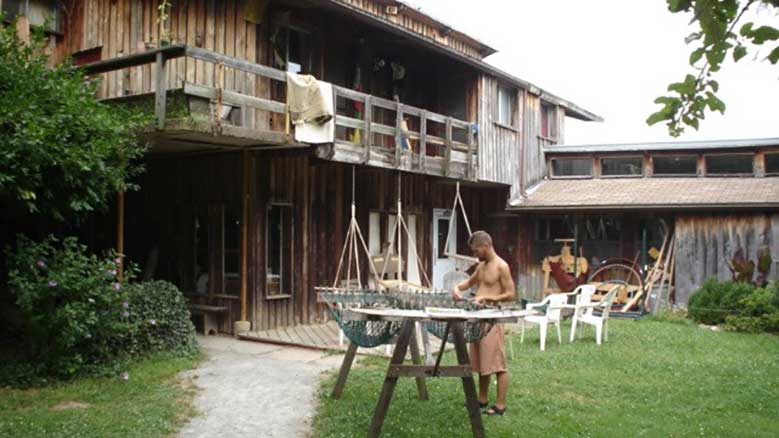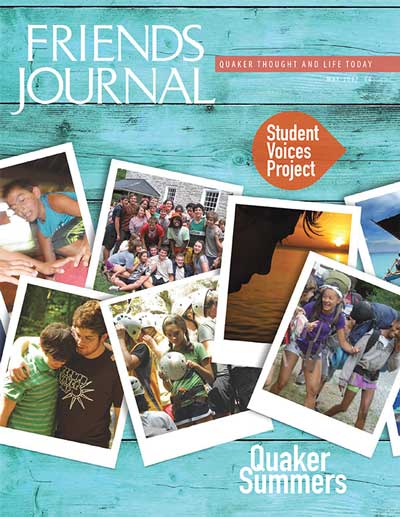
I am living the good life. I am well rested, nourished by tasty food, and content to have found the sweet spot of living in right relationship. I am warm and cozy by the woodstove after a few hours of outdoor work in the crisp sunshine of a Virginia winter. My housemates and I talk of possible plans for the evening: playing a board game, building a bonfire, working a few more hours, or attending a practice session on communications skills.
We are enjoying the many resources of 450 acres of wooded and farmed land in central Virginia with 100 other people who call this place, Twin Oaks Community, their home. They are all living comfortably, but also very differently from almost everyone else in the United States. Together they have created one of the most egalitarian, communal, and stable intentional communities in this country.
I am at Twin Oaks as part of the community’s three-week visitor program. As a Quaker, I yearned to be surrounded by people who were living and breathing the testimonies of simplicity, nonviolence, community, and equality. Though not a religious community, Twin Oaks has been a leader in alternative living and values in action since 1967. I had to see for myself.
Alongside seven other visitors from around the country, I experienced being a part of this strong intentional community. As visitors, we committed to not spend more than the member’s monthly allowance of about $100 and to embrace simplicity and communality. Twin Oaks members commit to radical sharing. They freeze their assets from their previous endeavors and share housing, meals, and supplies.
The average American consumes five times what our planet can sustain. The average Twin Oaker consumes to support just one healthy planet. They organically grow much of their own food, but not everything. They have solar panels and shared cars. They balance a commitment to values with practicality. And “scarcity” is not a word I have heard since arriving. While members refer to budget restraints and frugality, there are ample resources. The community provides for all basic needs.
The community’s bedrock is a commitment to egalitarianism through a complicated but liberating labor system. Each member works 42 hours a week. This is broadly defined; it includes childcare, cleaning, and cooking, covers most of the needed elements to sustain its population. I joyfully haven’t washed a dish since I arrived. But I have planted in the garden, raked leaves, cooked dinner, bagged tempeh, and helped make a hammock. Twin Oaks has a few successful collectively owned businesses that financially support the community while creating opportunities to support their deepest values. A professor and high school graduate work side by side in the tofu factory. There is an assumption and a culture that everyone is going to do good work and contribute positively in diverse ways. The combination of equal responsibility and simplicity leads to a high quality of life, and one very different from the mainstream.
I am impressed by this and by the seeming ease with which this community provides for itself. So many of us around the country spend our lives “making a living” so we squeeze what we really care about into evenings and weekends, exhausted but determined to make a difference. Our faith is bookended by appointments and errands. We are in the car a lot. We are stressed. Here at Twin Oaks I find myself with ample free time. I linger over conversations and take walks. I read. The long-term members make art, spend time with their friends and children, and participate in “movement-building” by volunteering locally and traveling to relevant protests and demonstrations. They spend time figuring out how Twin Oaks can do better. I went to a lunchtime chat about the implications of having online movie streaming for their community, which has a “no TV” rule. The orientation pamphlet title is “Not Utopia Yet.”
Reminiscent of my experiences in Quaker communities, not everyone likes each other here. People gossip. While there is a growing interest in direct communication and conflict resolution, a culture of conflict-avoidance permeates here too. Also like a community of Friends, most members are invested in and committed to the community, and consider it worthy of their time and energy. And if they don’t, they can try to make changes or leave. In both communities, members share decision making.
Unlike Friends, there is no group worship at Twin Oaks. There is no guiding Spirit. Twin Oakers don’t hold hands before a meal or share a 400-year-old culture of alternative values and struggle. Still, in many ways, I see people here at Twin Oaks living our values more completely than most of us do as a Religious Society.
Friends, let’s find inspiration here!
One long-time member reflected that Twin Oaks, which will celebrate its fiftieth anniversary next year, is “no longer an experiment but a model.” They have figured out a lot. A serious commitment to values is possible when there is a supportive social structure that sits on a foundation of shared economies. I’d like us to learn together how we could do more of this as Friends, to find inspiration together for how to live creative, value-driven lives. Here is a peek into right livelihood—and it is joyous and possible. Not all of us are going to live in an intentional community, but we can take lessons from our peers and move forward as a Society toward lives of better sharing, simplicity and equality.





Comments on Friendsjournal.org may be used in the Forum of the print magazine and may be edited for length and clarity.